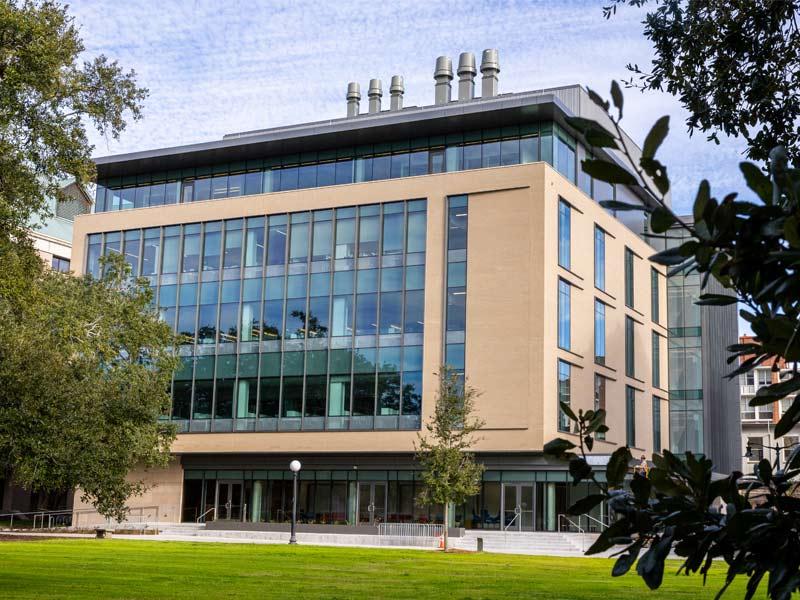Tulane opens Paul Hall, a transformative home for science and engineering
The start of the spring semester welcomed students and faculty to the Steven and Jann Paul Hall for Science and Engineering, a new, state-of-the-art building for discovery and learning that promises to take interdisciplinary research and innovation to a global level at Tulane.
Located on the Academic Quad between Donna and Paul Flower Hall and Stanley Thomas Hall in the heart of the campus’s growing science district, the five-story, 76,000-square-foot building features flexible laboratories, innovative classrooms and common spaces for increased student and faculty interaction. It is an interdisciplinary research building that houses the Tulane Brain Institute, as well as researchers from many Tulane School of Science and Engineering departments, including biomedical engineering, computer science, engineering physics, psychology and cell and molecular biology.
Construction on the building began in 2020 with a lead gift of $10 million from Tulane graduates Steven and Jann Paul. In making the gift, the couple said Tulane’s creative and curious science and engineering students deserve the best resources possible. Steven Paul is president of research and development and chief scientific officer at Karuna Therapeutics. Jann Paul is a graduate of the Tulane School of Social Work.
“Paul Hall is one of the most ambitious and significant expansions in Tulane’s history,” President Michael A. Fitts said. “It is a place where students, scientists and entrepreneurs will join together in pioneering research, in interdisciplinary learning and in making discoveries that can then be brought to the marketplace faster and improve lives worldwide.”
In addition to rigorous studies in biomedical, materials science, engineering and numerous fields of science, students and faculty will learn the complexities of technology transfer and intellectual property and be given the tools to help their innovations succeed.
"This building was designed to support path-breaking, multidisciplinary research and innovative, engaged teaching and is an exciting and inspiring embodiment of our ambitious vision for the future of the sciences and engineering at Tulane," said Robin Forman, senior vice president for academic affairs and provost.
Program space in Paul Hall includes three floors of interdisciplinary research laboratories for principal investigators, core facilities where researchers can share state-of-the art equipment and services, an animal research facility, a 200+ seat auditorium, and student gathering and study areas on the ground floor. An enclosed penthouse contains critical mechanical and electronics equipment necessary to operate the building.
“We are so grateful to the Pauls for their incredible generosity that has led to this incredible new home for our students, faculty and staff,” said Kimberly Foster, dean of the School of Science and Engineering. “A facility such as this is vital in attracting the best students and researchers and empowering them to build the future and make the discoveries of tomorrow.”
The building includes walkways connecting to neighboring Flower Hall, spurring collaboration by adjoining researchers to another one of Tulane’s primary research spaces.
Paul Hall will also include a new, state-of-the art nanofabrication cleanroom that will enable students, faculty and commercial partners across the region to conduct advanced semiconductor and materials science research and development.
The cleanroom’s location next door to the Scot Ackerman MakerSpace will provide the opportunity to quickly prototype discoveries. The cleanroom, made possible with $5 million in state and federal funding, will be available to researchers at Tulane, Xavier University, the University of New Orleans and others, with the goal of promoting rapid development of existing regional research collaborations.
In providing the lead gift, Steven Paul cited his experience as an undergraduate working in the laboratory of Tulane professor Merle Mizell in the old Dinwiddie Hall.
“I look back at those days and see the foundations for my own career, and I want to contribute to similar formative experiences of other Tulane students,” he said. “If the last 50 years have taught us anything, it’s that the greatest advances happen at the interface of scientific disciplines,” Paul said.

